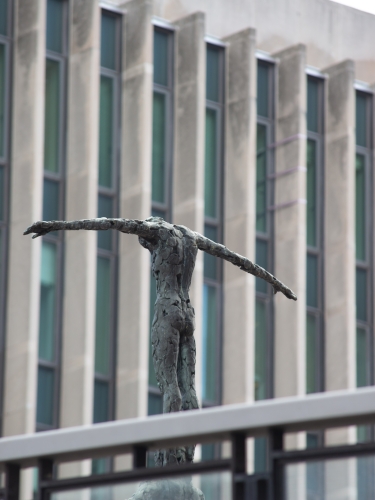
24 Groups to Secretary Austin: Make Amends for Civilian Harm in Somalia
December 18, 2023
Lloyd J. Austin III
Secretary of Defense
1000 Defense Pentagon
Washington, DC 20301
Dear Secretary Austin,
The undersigned Somali and international human rights and protection of civilians organizations write to request that you take immediate steps to address the requests of families whose loved ones were killed or injured by US airstrikes in Somalia. New reporting illustrates how in multiple cases of civilian harm in Somalia confirmed by the US government, civilian victims, survivors, and their families have yet to receive answers, acknowledgement, and amends despite their sustained efforts to reach authorities over several years.
On April 1, 2018, Luul Dahir Mohamed, a 22-year-old Somali woman, and her 4-year-old daughter Mariam Shilow Muse were killed in a US drone strike in El Buur, Somalia. The US military confirmed their deaths in 2019 and acknowledged that they were civilians. Despite this admission, new reporting by The Intercept and an op-ed by Luul’s brother Abubakar Dahir Mohamed detail the family’s painstaking efforts over the last four years to reach anyone in the US government, have their family’s pain acknowledged, and seek amends and justice for the harm caused.1 Abubakar and his family reported the harm through the US Africa Command (AFRICOM) civilian casualty reporting portal, as well as to the Somali government. To date they say they have yet to receive acknowledgment of their communications, let alone a substantive reply.
“Since the strike, our family has been broken apart. It has been more than five years since it happened, but we have not been able to move on,” wrote Abubakar. “Even as we have contacted [the US government] in every way we know how, we have never been able to even start a process of getting justice. The US has never even acknowledged our existence.”2
The US response thus far stands in stark contrast to this administration’s stated priorities of mitigating, responding to, and learning from civilian harm. In light of these commitments, it is
unfathomable that Abubakar and his family have for so long struggled to receive acknowledgment or amends from the United States. We urge the Department of Defense to urgently make long-overdue amends in consultation with Abubakar’s family and their representatives, including condolence payments and an explanation for why their demands appear to have been ignored until now.
This is far from the only instance in Somalia in which the Defense Department has confirmed that its actions killed civilians yet not made any efforts to contact survivors, offer condolences or explanations, or make amends, according to research by multiple undersigned organizations, among others. In February 2020, a US drone strike hit a residential house in Jilib, Somalia, as a family was sitting down to dinner.3 The strike killed 18-year old Nurto, badly injured her two younger sisters and elderly grandmother, and continues to traumatize their family.4 Like Luul’s family, Nurto’s family have been seeking answers and amends since her death with no success.5 In three other cases, AFRICOM similarly confirmed civilian harm resulting from US operations yet has not contacted nor offered amends to civilian victims and survivors or their families.6
The Department of Defense has at its disposal $3 million of annual funding provided by the US Congress to make ex gratia payments to civilian victims and survivors of US operations. We know of no cases in which those funds have been used in Somalia, despite the fact that in numerous cases confirmed by the United States, the identities of civilian victims and survivors are known and their contact information has been made available through their own reporting or through civil society representatives.
In August 2022, the Defense Department issued a new Civilian Harm Mitigation and Response Action Plan (CHMR-AP), a comprehensive plan detailing new commitments to significantly reform how the US responds to civilian harm.7 The plan commits the US military to improving its ability to “acknowledge and respond to civilian harm when it occurs and to treat those who are harmed with dignity and respect.” Following through on this commitment requires responding to the inquiries of civilians seeking answers and making amends for the life-altering harm they and their families have experienced. We urge AFRICOM and the Department of Defense to do so immediately.
In other cases, the Defense Department has not confirmed civilian harm, but credible reporting from civil society groups or journalists indicates that the United States also killed or injured civilians. Where available information suggests the military’s initial review was flawed or incomplete, we urge the Department to re-investigate cases in light of their commitment to ensure civilians receive the acknowledgement they deserve and to allow the United States to learn from past civilian harm.
Signed,
Airwars
Amnesty International USA
Association of Concerned Africa Scholars (USA)
Caddalaad Doon
Center for Civilians in Conflict (CIVIC)
Coalition of Somali Human Rights Defenders (CSHRD)
Columbia Law School Human Rights Institute
Hiraan Women Development and Family Care (HRDFC)
Human Rights Watch
Juba Aid for Peace and Development Organisation (JAPDO)
Jubaland Youth Leaders (JYL)
Kalkal Human Rights Development Organization (KAHRDO)
Marginalized Community Advocacy Network (MCAN)
PAX
People's Aspiration and Human Rights Organization (PASHRO)
Reprieve US
Resilience Hope Foundation (RHF)
Somali Awareness and Social Development Organzation (SASDO)
Somali Legal Action Network (SOLAN)
Victim Advocates International (VAI)
Waamo
Women and Child Support Organization (WOCSO)
Youth Initiative and Human Rights Advocacy (YIHA)
Zomia Center
Cc: Gen. Michael E. Langley, Commander, U.S. Africa Command
The full report is available here.
